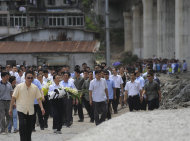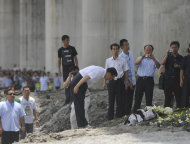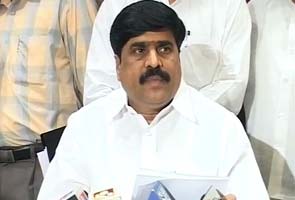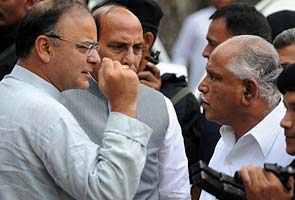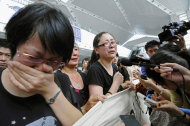 Relatives of the victims in Saturday's train crash talk to the media as they hold …
Relatives of the victims in Saturday's train crash talk to the media as they hold …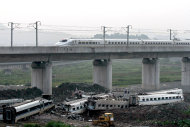 A bullet train passes over the wrecked carriages involved in Saturday's crash in …
A bullet train passes over the wrecked carriages involved in Saturday's crash in …
BEIJING (AP) — Design flaws in signal equipment and human error caused last weekend's high-speed train crash in China that killed at least 39 people, a railway official said Thursday.
The preliminary finding comes in the face of public anger about the government's handling of the accident near Wenzhou in Zhejiang province.
Premier Wen Jiabao, who arrived in Wenzhou on Thursday to check on the investigation and the conditions of the survivors, has called for a sweeping and transparent probe into the crash between two bullet trains, which also hurt more than 190 people.
Six train cars derailed and four fell about 65 to 100 feet (20 to 30 meters) from a viaduct Saturday night after one train plowed into the back of another train that had stalled after being hit by lightning.
An Lusheng, head of the Shanghai Railway Bureau, said there were design problems with the signal light equipment at the Wenzhou South Station and dispatchers did not send any warnings after the lightning strike.
"After the lightning strike caused a failure, an interval signal machine that should have shown a red light mistakenly upgraded it to a green light instead," An said in comments carried by state broadcaster CCTV.
The Beijing National Railway Research and Design Institute of Signal and Communication, which designed the signal equipment, on Thursday issued a letter of apology to the families of the victims and the injured passengers.
It said it would cooperate with the investigation and would "have the courage to assume responsibility and accept the punishment deserved."
Wen's visit comes a day after more than 20 relatives of people who died in the crash gathered at the Wenzhou South Station, holding banners demanding answers regarding the accident's cause, Chinese media reported.
"After such a big thing has happened, the railway departments cannot hide behind while they let the local governments deal with it and solve it. They are slow and won't show their faces. Is it the government that wants to protect them, or has the government been threatened by them?" one man surnamed Lin who lost his elder brother, Lin Xiao, in the crash, told the Yangcheng Evening News.
The government has ordered a two-month safety campaign for its railway system amid questions about how the crash occurred. Wen called for the campaign to be widened to target all transport infrastructure, coal mines, construction sites, and industries dealing with dangerous chemicals.
The accident was the biggest blow yet to China's burgeoning high-speed rail ambitions that have been highlighted as a symbol of the countries rising economic and technological prowess.
Rapid expansion of the services has been dogged by concerns about safety, corruption scandals and criticism that schedules are impractical and tickets too expensive for ordinary Chinese. Open just one month, the much-hyped 820-mile (1,318-kilometer) Beijing-Shanghai line has been plagued by power outages and other malfunctions.
Saturday's accident outside the eastern city of Wenzhou prompted an outpouring of anger among the public and even in the usually docile state media, with questions posed over the cause of the crash and the government's handling of the aftermath.
The firing of three top officials at the Shanghai Railway Bureau did little to tamp down criticism that authorities made only passing attempts to rescue survivors while ordering tracks swiftly cleared to restore service.
___
